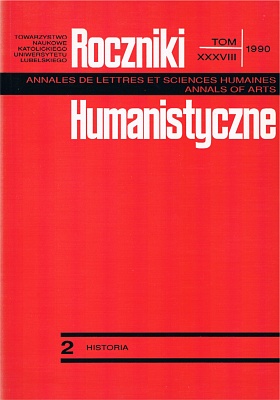Stronnictwo Ludowe na południowej Lubelszczyźnie w latach 1935-1936
Abstrakt
The Peasant Party in the southern part of Lublin region was not too active after the December Congress (held on December 7-8, 1935). In the beginning it suffered shortage of staff due to the secession of the so-called Malinowski group to which belonged the leading activists from this area. The party’s activity developed at a slow pace during which period there were being organized economico-political courses and new branches were being set up. At the same time the Peasant Party had to fight for influence out of Lublin, mainly with the National Party. It all went until the Folk Holiday (31st May and 1st June 1936) which had a high turnout. The peak of the activity of the Peasant Party fell on the period starting from the time of Grząska-Nowosielce manifestation (29th June 1936) to the organization of the festival „Peasant Deed”, but one month afterwards there ensued the period of pacification. As a result of the latter the most active, second only to Little Poland’s, centre of peasants, movement was put down.
Contrary to the hitherto settlements one can say that the Peasant Party developed mainly thanks to unusual generosity and work of activists based out of Lublin. The so-called „masses” did not infuence the activity of the Peasant Party. District organizations were the more active the better their leaders worked.
The development of the Peasant Party as well as its further radicalism would have been more intensive, had not the conditions in which it worked been extremely hard. Despite the fact that the Peasant Party was a legal party, yet it faced on its way a conscious counteraction on the part of administration Lack of a homogenous political plan was also harmful to the party. It had been worked out mutually either by national (Maciej Rataj) or emigrant (Wincenty Witos) leadership.
The party’s work proved that it was not communist slogans that won acclaim among peasants, but radical slogans which came mainly from the emigrant centre and were directly linked with one authority which for the Polish village was at that time Wincenty Witos.
Despite most radical slogans the activists from the Peasant Party never questioned the programme of December 1935. Hence they acknowledged private property and individual agricultural workshop, and it is at that point that they could not agree with the communist model.
The peasants who were members of the Peasant Party owned farms. Like in other regions of the country the most active were those peasants who were not involved in any other work beyond their farmland. The land constituted as it were a barrier, that is why it was impossible to bring the Marxist slogans home to peasants. Such observations are supported by the fact that the greatest influence of communists in the southern part of Lublin region were apparent beyond the organizations of national minorities, among the members of the Trade Union of Agricultural Workers and Trade Union of Petty Farmers.
It is worth noting that the further up in the hierarchy of the Peasant Party the greater percentage constituted the intelligentsia.
The above events proved once again that peasants were attached to their land, Polish statehood and Polish historical tradition in its specific character.
Due to a lack of historical material a lot of questions concerning the activity of the Peasant Party are still left unsolved.
Copyright (c) 1990 Roczniki Humanistyczne

Utwór dostępny jest na licencji Creative Commons Uznanie autorstwa – Użycie niekomercyjne – Bez utworów zależnych 4.0 Międzynarodowe.





